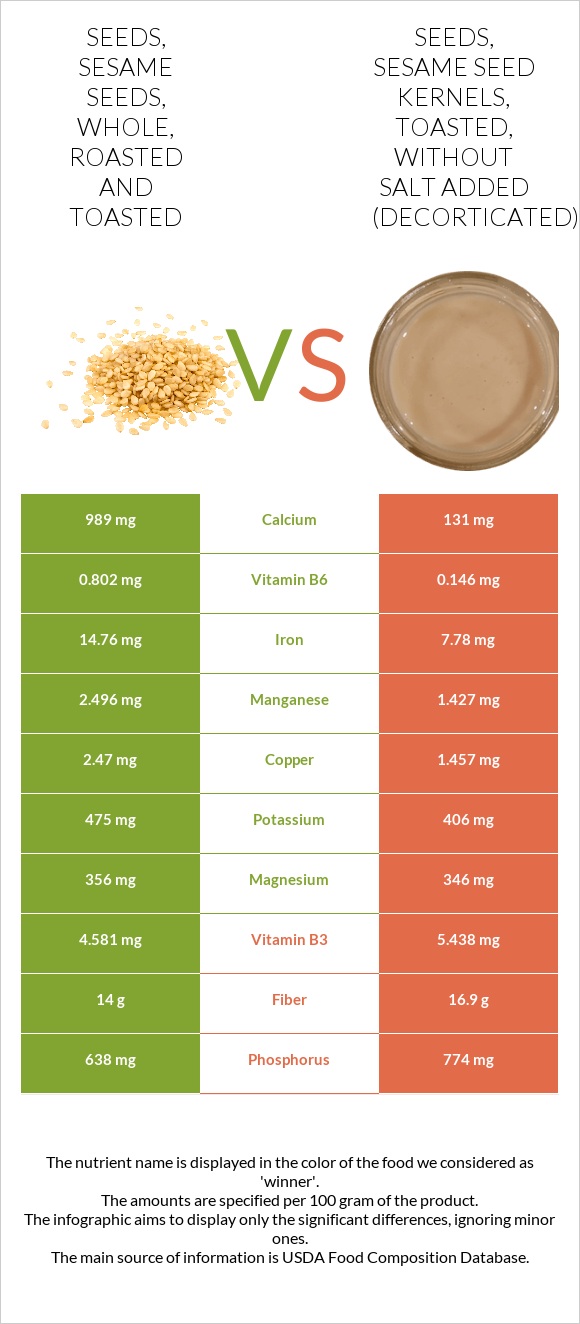Seeds, sesame seeds, whole, roasted and toasted vs. Seeds, sesame seed kernels, toasted, without salt added (decorticated) — In-Depth Nutrition Comparison
Compare
Summary of differences between seeds, sesame seeds, whole, roasted and toasted and seeds, sesame seed kernels, toasted, without salt added (decorticated)
- Seeds, sesame seeds, whole, roasted, and toasted has more copper, iron, calcium, vitamin B6, and manganese; however, seeds, sesame seed kernels, toasted, without salt added (decorticated) is higher in vitamin B1, zinc, phosphorus, vitamin B2, and vitamin B5.
- Seeds, sesame seeds, whole, roasted, and toasted covers your daily need for copper, 113% more than seeds, sesame seed kernels, toasted, without salt added (decorticated).
- Seeds, sesame seeds, whole, roasted, and toasted has 8 times more calcium than seeds, sesame seed kernels, toasted, without salt added (decorticated). While seeds, sesame seeds, whole, roasted, and toasted has 989mg of calcium, seeds, sesame seed kernels, toasted, without salt added (decorticated) has only 131mg.
These are the specific foods used in this comparison Seeds, sesame seeds, whole, roasted, and toasted and Seeds, sesame seed kernels, toasted, without salt added (decorticated).
Infographic

Infographic link
Mineral Comparison
Mineral comparison score is based on the number of minerals by which one or the other food is richer. The "coverage" charts below show how much of the daily needs can be covered by 300 grams of the food.
| Contains more CalciumCalcium | +655% |
| Contains more PotassiumPotassium | +17% |
| Contains more IronIron | +89.7% |
| Contains more CopperCopper | +69.5% |
| Contains less SodiumSodium | -71.8% |
| Contains more ManganeseManganese | +74.9% |
| Contains more ZincZinc | +42.9% |
| Contains more PhosphorusPhosphorus | +21.3% |
Vitamin Comparison
Vitamin comparison score is based on the number of vitamins by which one or the other food is richer. The "coverage" charts below show how much of the daily needs can be covered by 300 grams of the food.
| Contains more Vitamin B6Vitamin B6 | +449.3% |
| Contains more Vitamin AVitamin A | +∞% |
| Contains more Vitamin B1Vitamin B1 | +50.1% |
| Contains more Vitamin B2Vitamin B2 | +85.7% |
| Contains more Vitamin B3Vitamin B3 | +18.7% |
| Contains more Vitamin B5Vitamin B5 | +1233.3% |
All nutrients comparison - raw data values
| Nutrient |  |
 |
DV% diff. |
| Copper | 2.47mg | 1.457mg | 113% |
| Iron | 14.76mg | 7.78mg | 87% |
| Calcium | 989mg | 131mg | 86% |
| Vitamin B6 | 0.802mg | 0.146mg | 50% |
| Manganese | 2.496mg | 1.427mg | 46% |
| Vitamin B1 | 0.803mg | 1.205mg | 34% |
| Zinc | 7.16mg | 10.23mg | 28% |
| Phosphorus | 638mg | 774mg | 19% |
| Vitamin B2 | 0.251mg | 0.466mg | 17% |
| Vitamin B5 | 0.051mg | 0.68mg | 13% |
| Fiber | 14g | 16.9g | 12% |
| Vitamin B3 | 4.581mg | 5.438mg | 5% |
| Choline | 25.6mg | 5% | |
| Magnesium | 356mg | 346mg | 2% |
| Potassium | 475mg | 406mg | 2% |
| Vitamin E | 0.25mg | 2% | |
| Sodium | 11mg | 39mg | 1% |
| Folate | 98µg | 96µg | 1% |
| Calories | 565kcal | 567kcal | 0% |
| Protein | 16.96g | 16.96g | 0% |
| Fats | 48g | 48g | 0% |
| Net carbs | 11.74g | 9.14g | N/A |
| Carbs | 25.74g | 26.04g | 0% |
| Sugar | 0.48g | N/A | |
| Vitamin A | 0µg | 3µg | 0% |
| Selenium | 34.4µg | 34.4µg | 0% |
| Saturated fat | 6.722g | 6.722g | 0% |
| Monounsaturated fat | 18.127g | 18.127g | 0% |
| Polyunsaturated fat | 21.039g | 21.039g | 0% |
| Tryptophan | 0.371mg | 0.371mg | 0% |
| Threonine | 0.704mg | 0.704mg | 0% |
| Isoleucine | 0.73mg | 0.73mg | 0% |
| Leucine | 1.299mg | 1.299mg | 0% |
| Lysine | 0.544mg | 0.544mg | 0% |
| Methionine | 0.56mg | 0.56mg | 0% |
| Phenylalanine | 0.899mg | 0.899mg | 0% |
| Valine | 0.947mg | 0.947mg | 0% |
| Histidine | 0.499mg | 0.499mg | 0% |
Macronutrient Comparison
Macronutrient breakdown side-by-side comparison
Protein:
16.96 g
Fats:
48 g
Carbs:
25.74 g
Water:
3.3 g
Other:
6 g
Protein:
16.96 g
Fats:
48 g
Carbs:
26.04 g
Water:
5 g
Other:
4 g
| Contains more OtherOther | +50% |
| Contains more WaterWater | +51.5% |
~equal in
Protein
~16.96g
~equal in
Fats
~48g
~equal in
Carbs
~26.04g
Fat Type Comparison
Fat type breakdown side-by-side comparison
Saturated fat:
Sat. Fat
6.722 g
Monounsaturated fat:
Mono. Fat
18.127 g
Polyunsaturated fat:
Poly. Fat
21.039 g
Saturated fat:
Sat. Fat
6.722 g
Monounsaturated fat:
Mono. Fat
18.127 g
Polyunsaturated fat:
Poly. Fat
21.039 g
~equal in
Saturated fat
~6.722g
~equal in
Monounsaturated fat
~18.127g
~equal in
Polyunsaturated fat
~21.039g